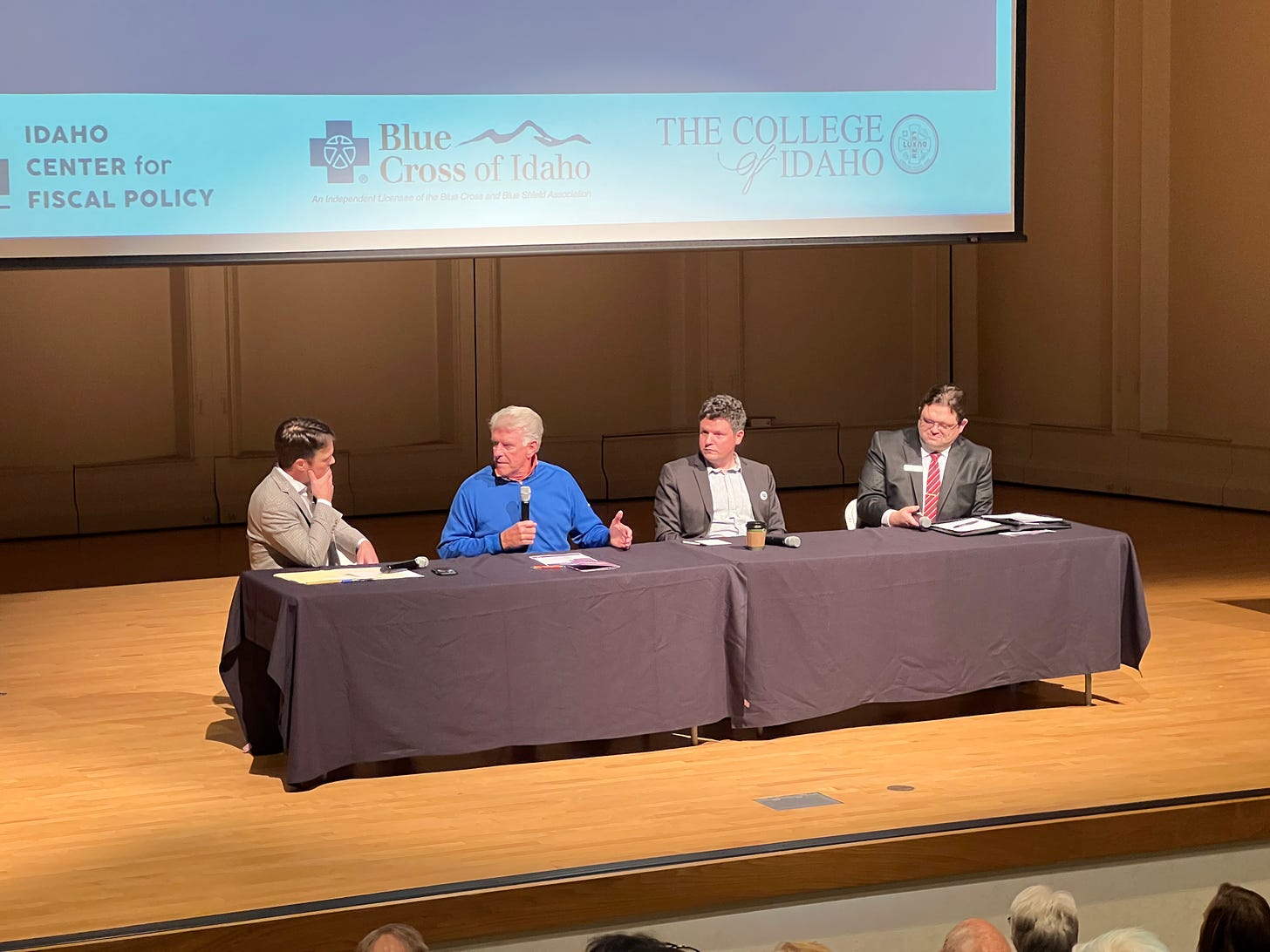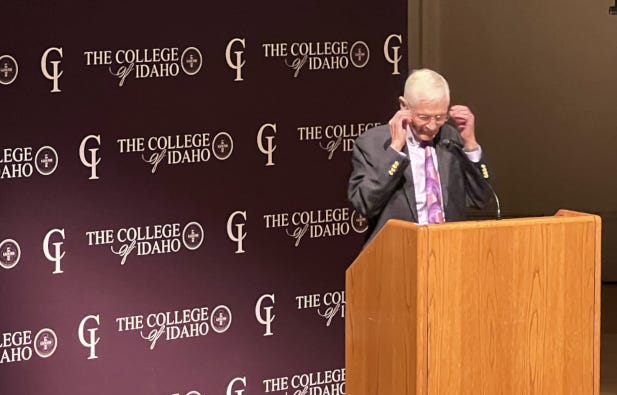As you know, a coalition of mostly left wing groups is circulating an initiative to completely change how we vote in Idaho. I wrote last August about how the promoters of this initiative are engaging in a sleight of hand by advertising it as “open primaries” when in reality it is much more than that.
Open primaries, or more accurately the blanket top four primary and ranked choice voting initiative, was the subject of a panel at last week’s Idaho Policy Forum. Boise council member Patrick Bageant moderated between former governor Butch Otter, Reclaim Idaho founder Luke Mayville, and BSU scholar Matthew May, who wrote his doctoral dissertation on the subject of primary elections.
As I discussed in yesterday’s post, the deck was stacked — not only did the panel feature two in favor of the initiative and one who was meant to be neutral, but the subsequent keynote from former attorney general Jim Jones was an angry rant against the Idaho Republican Party and conservative principles in general.
However, May did a great job of laying out the core of the controversy. He explained that there are two views about the purpose of a primary: Is it a contest within political parties to select their nominee for the general election, or is it simply the first round of a two-round election?
This is the meta narrative that has been missed in most debates over the initiative. Reclaim Idaho and their allies are not looking to make merely small reforms to the way we hold elections, rather they want to implement a new and novel system in its place. How many people would have signed the initiative petition if they realized the gravity of this change?
The right of a political party to choose its own nominees has been taken for granted for most of American history. Political parties first developed in England, but they quickly took hold in America because our system incentivizes them. A majority, whether in the US Congress or our Legislature, has nearly absolute power over the makeup of committees, chamber leadership, and whether or not bills will be heard on the floor. Thus it is reasonable for legislators to coalesce into groups dedicated to achieving that and preserving that majority, and those in the minority must coalesce to advance their own interests as well.
Mayvile said several times that our founders did not support the idea of political parties, but this is not entirely true. It was our founders that created the first American political parties in the first place. George Washington distrusted the idea of parties, but they were inevitable. Two factions had formed within his cabinet, so when he retired, these two factions each advanced their own nominee to succeed him. John Adams’ party would become known as the Federalists while Thomas Jefferson’s cohort was initially called the Republicans, then the Democratic-Republicans, and finally evolved into today’s Democratic Party.
For much of American history, parties selected their nominees via a caucus or a convention. These kinds of events attract political junkies and insiders, as regular people have neither the time nor the inclination to participate. The Progressive Era saw attempts to create a system that included as many voters as possible, but how to do so was neither obvious nor easy. The Idaho Legislature struggled with how to implement a direct primary system in the early 1900s, as parties worried that such a system could be taken advantage of by their opposition. During the first three decades of the 20th century, the Legislature alternated between direct primaries, open primaries, closed primaries, and conventions.
During the 1960s, Idaho enacted a pre-primary convention wherein political parties could nominate two candidates for the primary ballot. The purpose was to avoid the vote splitting that has become so troublesome today. However, this was abandoned by 1972 when the Legislature returned to an open primary. Under this system, voters could select any party’s ballot at the polling place without having to be registered members of a party. This system was overturned in 2012 after a court ruled that the state could not force parties to allow non members to participate in their primary.
As you can see, the question of how to balance voter participation with partisan integrity has vexed Idaho for more than a century. However, the new initiative seeks to do something radical that has never been done in our state before. Even the open primary still maintained the system in which parties submit nominees to the general election. The new top four primary eliminates the party from the process entirely.
Maybe you think that’s a great idea. Perhaps you believe that political parties are what’s wrong with America, and that what we need is more direct representation by the people themselves. Consider, however, that people will always associate with others with similar ideologies so as to accomplish their shared goals. The alternative is nothing less than outright mob rule.
Our founders bequeathed to us a constitutional representative republic, not an absolute democracy. In a republic, the people elected men from amongst themselves to represent them at various levels of government. Absolute democracy, aka mob rule, might seem more fair and progressive on the surface, but it is ironically often used to establish tyranny.
In ancient Rome, the Gracchi brothers used the mob to accomplish their political goals, calling for protests or even riots when they needed to put pressure on the Senate. Soviet Russia, Fascist Italy, and Nazi Germany all used the mob to silence opposition and convey a veneer of representative legitimacy to their regimes. Our founders wisely created a system where the majority was constrained with a constitutional framework that serves as a hedge against tyranny.
“A person is smart. People are dumb, panicky, dangerous animals and you know it.”
Agent Kay, Men in Black
Removing parties from the primary creates a nonpartisan veneer, but like municipal elections, there are still serious ideological battles at stake. Leftists like Butch Otter and Luke Mayville present a vision of politics without politics, where social issues are jettisoned in favor of purely economic debates, but with the implicit understanding that their social views get to have supremacy. School librarians stocking inappropriate materials is non-political while parents demanding their removal is political. See how this works?
Ranked choice voting makes it easier for moderates and those with institutional support to hold on to power. Mayville and friends say this is a good thing, because it means that victors will represent a greater share of the electorate, but I fear it will simply select for politicians without principles who promise everything to everyone without taking a firm stand on anything.
For evidence, look no further than Reclaim Idaho’s first successful initiative, Medicaid Expansion. They promised the moon with their petition, vowing that it was inexpensive, efficient, and necessary. Now, just a few years later, costs are spiking out of control, able-bodied men and women are taking up space on the program, and there is no reform in sight. Voters signed the Medicaid Expansion petition and then approved it at the ballot in good faith, and were rewarded with a fiscal time bomb.
The end result of completely changing the way we vote will be an electorate that is atomized from each other and even more dependent upon big organizations like Reclaim Idaho and long-incumbent politicians. The powerful will only get more powerful, and insurgent campaigns will become even harder.
That is the point, of course. Jim Jones gave the game away in his keynote when he said the whole point of the initiative is to break what he called the “stranglehold” that Dorothy Moon has on Idaho politics. In what world is this the case? Right now there are probably 20 legislators who align with Moon’s positions, and perhaps another 20 more who are adjacent. A majority of our representatives and senators pledge allegiance to IACI, to the governor, to the special interests that think they run our state and our country.
Like all leftists, Jones can’t conceive of legitimate opposition. The left can control 99% of a system and still point to the remaining 1% as evidence that their opponents need to be destroyed. Dorothy Moon was elected to lead the Idaho Republican Party by the grassroots, not by powerful figures like Jim Jones or Butch Otter. Yet they point to her and pretend that she represents special interests instead.
In the end, that is what this initiative is about —locking out grassroots conservatives in favor of an electorate that will keep the moderate establishment in power forever. Partisanship is not always a bad thing. Political parties, when working correctly, amplify the voices of the grassroots, rather than silencing them. It’s political players such as Otter that seem to distrust the people; they seem to think it’s better to let the experts decide things rather than regular folks like you and me.
This initiative is not about opening up the political process to more people, rather it is a radical and unprecedented change to the way we elect our representatives. Unfortunately, the backers of the initiative don’t want to have that debate. They would rather send out paid signature gatherers who scare uninformed citizens into believing they are in danger of being disenfranchised, so they sign the petition.
Is that the future of electoral politics in Idaho, and in the nation? It might well be if you sign the petition and vote for the initiative should it make the ballot next year. To be honest, nobody really knows exactly how politics would play out, as Matthew May explained at the forum. We don’t even have enough data to decide how the closed primary has affected Idaho politics, much less an entirely novel and untried system. Political parties and candidates would surely alter their strategies should it pass, so how it will look after a few election cycles is anybody’s guess. Reclaim Idaho and their allies are sure that it will be better, because I suspect they see the short term gain for their favored policies. But as Otter and Jones might well say, après moi, le déluge.






Thanks for the update, Brian. I’ve added a link in my condensed article on the same topic. For anyone interested, see “Jungle Primaries & Ranked Choice Voting (RCV) Ballot Initiative: A Race to the Bottom”: https://open.substack.com/pub/eolson47/p/jungle-primaries-and-ranked-choice